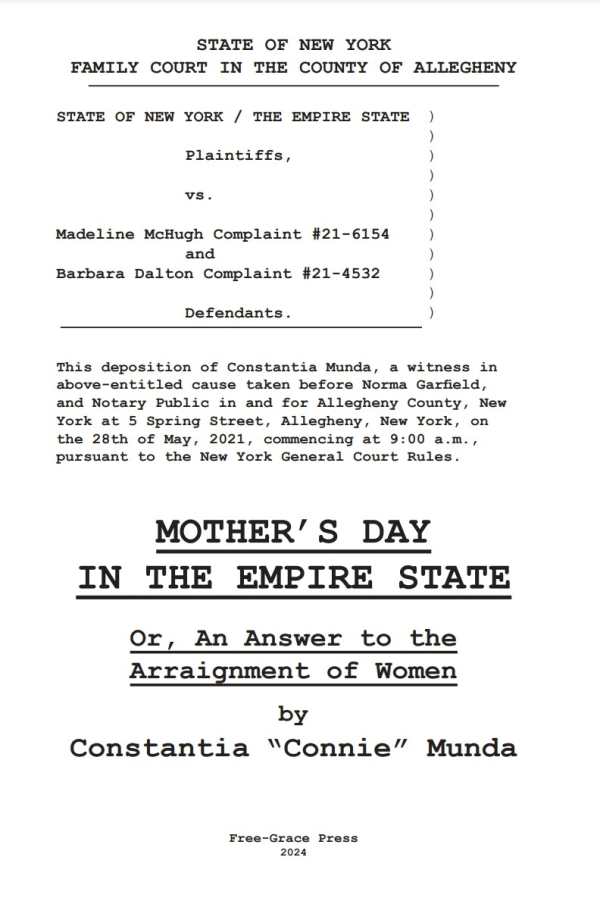Mother's Day in the Empire State: Or, An Answer to the Arraignment of Women
Narrated with sardonic humor, this satirical novel contrasts the state’s treatment of women at different socioeconomic levels to make searing points.
A government employee is deposed in a child abuse investigation in Constantia Munda’s political novel Mother’s Day in the Empire State: Or, An Answer to the Arraignment of Women.
“Dear Honorable Family Court and Good Reader,” begins the deposition of Connie, a child protective specialist for New York. It is a call with no response, because this is a recorded deposition taken en route to Connie’s latest assignment, a dual investigation of child abuse complaints against two women on Mother’s Day weekend in Allegheny County. The complaints are lodged against neighboring Appalachian women from different socioeconomic strata: one is wealthy, while the other lives below the poverty line. Both are mothers and grandmothers, facing challenges to their autonomy and authority. Neither is aware of the anonymous complaints against them, nor are they aware that the government machine has made it so that personal and family success is impossible.
Though structured like a deposition, the narrative is winding, taking an indirect path to investigating the complaints at the novel’s center. The first third of the book lays the foundation for understanding the paternalistic state. The remaining two-thirds of the book is focused on the women at the center of the complaints. Chapters alternate between them as Connie records her observations of their interactions over the course of several hours and draws parallels to her own experiences. Also included in the deposition are black-and-white illustrations, labeled as “People’s Exhibits.”
The book likens the relationship between the state and the citizen to that between a mother and her child, asserting that the ways the state interacts with its citizens constitutes an abusive relationship. It calls out imperialism, corruption, and cronyism at the state level through Connie’s recounting of her military service as an intelligence officer. In doing so, the narrative reveals a tension between what is and is not considered the truth and the intricate ways that statecraft, espionage, and war affect the home country and its citizens, mothers in particular.
Pop culture references abound, rooted in Appalachian culture and identity. Parsing whether the respect for the hardships and contradictions of Appalachian living that Connie exhibits is genuine or contrived is puzzling work, though. The ad absurdum way the book uses the complaints to examine two approaches to womanhood and motherhood within this corner of society serves to further obscure that vein of inquiry.
Slow-paced throughout, the narrative rewards patience, moving through dense language paired with dry, sardonic humor that’s reliant on wordplay and lengthy setups. There are references to the real world too, blurring the line between fiction and fact to punctuate the book’s points as it deals with complicated subjects, including the hypocrisy of a religious artist, bleak lived realities, and contrived family connections.
With biting wit, the charged satirical novel Mother’s Day in the Empire State: Or, An Answer to the Arraignment of Women takes aim at the state’s contradictory views of women and their roles in family and society.
Reviewed by
Dontaná McPherson-Joseph
Disclosure: This article is not an endorsement, but a review. The publisher of this book provided free copies of the book and paid a small fee to have their book reviewed by a professional reviewer. Foreword Reviews and Clarion Reviews make no guarantee that the publisher will receive a positive review. Foreword Magazine, Inc. is disclosing this in accordance with the Federal Trade Commission’s 16 CFR, Part 255.

